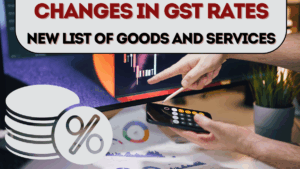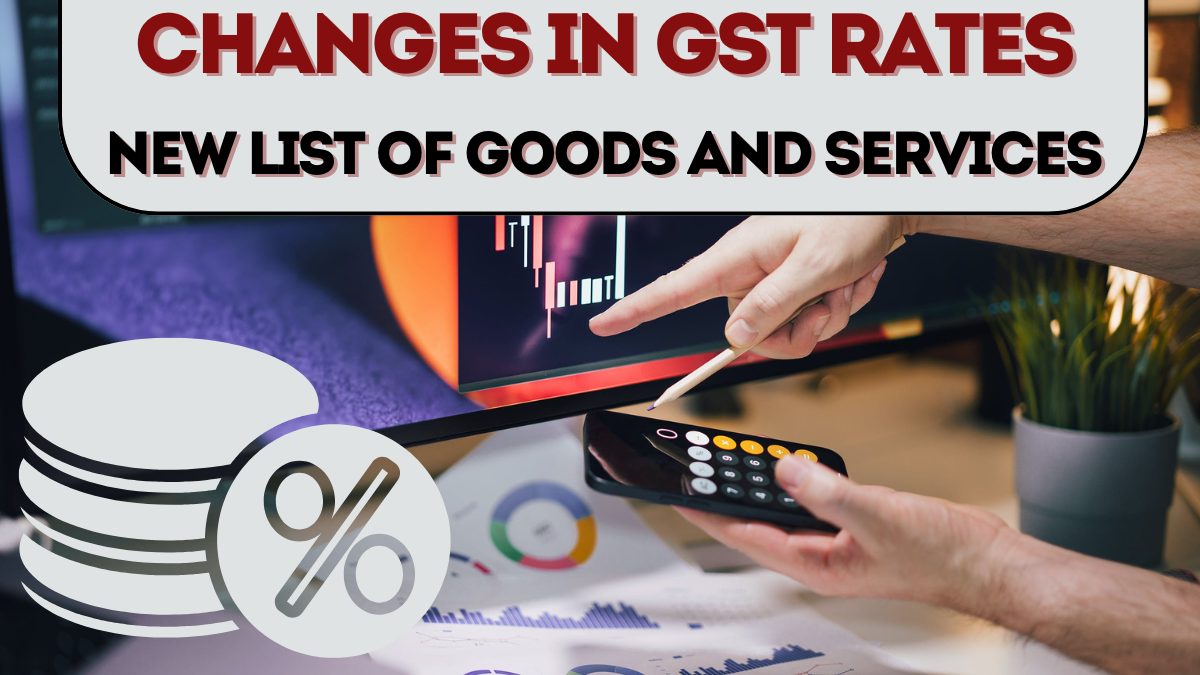The Goods and Services Tax (GST) has been one of the most significant reforms in India’s taxation system since its launch in 2017. Designed to simplify indirect taxes, it brings both opportunities and challenges for businesses and consumers. In September 2025, the government has announced new GST rate changes effective from 1st September, covering essential goods, luxury products, and services across industries. These updates are part of the GST Council’s decision to align tax rates with current market realities and revenue needs.
The GST rate changes India September 2025 are aimed at balancing consumer affordability with government revenue generation. While some items have seen rate reductions to boost demand, others have experienced hikes to discourage excessive consumption or to meet fiscal targets. For businesses, these changes require immediate updates in billing software, compliance systems, and pricing strategies.

Why GST Rates Are Changing in September 2025
The GST Council meets regularly to review the impact of tax structures on the economy. The September 2025 changes were driven by multiple factors:
-
Encouraging consumption in sectors like electronics and travel by reducing rates.
-
Promoting sustainability with tax cuts on eco-friendly goods and green energy products.
-
Revenue generation through higher GST on luxury items, tobacco, and processed foods.
-
Correcting anomalies in previously uneven tax structures across categories.
These revisions also reflect India’s commitment to creating a simpler and more predictable tax regime while keeping pace with evolving consumer needs.
Key Goods and Services Affected
Here’s a summary of the major GST updates announced for 1st September 2025:
| Category | Previous Rate | New Rate (Sept 2025) | Remarks |
|---|---|---|---|
| Electric Vehicles (EVs) | 5% | 3% | Reduced to promote clean mobility adoption. |
| Solar Panels & Renewable Equipment | 12% | 8% | Encouragement for sustainable energy. |
| Air Conditioners & Refrigerators | 28% | 30% | Increased due to luxury classification. |
| Mobile Phones | 18% | 12% | Reduced to boost digital adoption. |
| Packaged Foods (Processed) | 12% | 18% | Increased due to rising consumption. |
| Hotels (Luxury > ₹7,500 per night) | 18% | 20% | Hike in high-end hospitality. |
| Public Transport (Electric Buses) | 5% | 0% | Fully exempted to encourage sustainable mobility. |
| Alcohol-Based Energy Drinks | 28% | 30% | Taxed higher as a health measure. |
| Educational e-Books | 12% | 5% | Reduced to promote digital learning. |
These changes highlight the government’s dual focus on sustainability and fiscal discipline.
Impact on Businesses
For businesses, GST changes in September 2025 mean immediate compliance updates. Companies must:
-
Update invoicing software to reflect new tax rates from 1st September.
-
Communicate price adjustments to consumers clearly to maintain trust.
-
Train accounting teams to ensure proper filing under the revised rates.
-
Stock management adjustments to avoid losses from pre-rate change inventory.
For startups and small businesses, especially in electronics, hospitality, and retail, these changes present both opportunities and challenges. For instance, the reduction of GST on mobile phones could boost sales, while the increase in processed food taxes may impact small manufacturers.
Impact on Consumers
For consumers, these GST changes have mixed outcomes.
-
Cheaper electronics such as mobile phones will benefit students and professionals, encouraging digital inclusion.
-
Eco-friendly products like EVs and solar panels becoming more affordable will push households toward green living.
-
Higher hotel tariffs and costlier packaged foods may strain family budgets.
-
Public transport exemptions will lower fares in some states, making travel more economical.
Overall, the GST Council has tried to balance affordability with discouraging luxury and unhealthy consumption.
Compliance and Filing for September 2025
Businesses need to remember that the revised GST rates are applicable from 1st September 2025. Any invoices generated before this date will follow the old rates, while invoices from 1st September onwards must reflect the new rates. Failure to update invoices could lead to penalties during GST audits. The GST Council has also announced simplified filing procedures for small businesses to reduce compliance burdens.
Industry Reactions
Industry experts have welcomed the cuts on mobile phones and renewable energy products, stating they will stimulate both demand and sustainable growth. However, associations representing food processors and hospitality have expressed concerns about the increased rates. Economists believe that the September 2025 changes will increase government revenue while pushing India’s economy towards sustainable consumption.
Final Thoughts
The GST rate changes India September 2025 represent a significant shift in India’s indirect tax structure. While some goods will become more affordable, others will see price hikes. Consumers should prepare for these changes, and businesses must quickly adapt to remain compliant. By lowering taxes on eco-friendly and digital goods, the government has signaled its intent to encourage sustainable and inclusive growth. At the same time, higher taxes on luxury and unhealthy items reflect fiscal and social responsibility. For both buyers and businesses, keeping track of these changes is essential to avoid confusion and maximize benefits.
FAQs
When will the new GST rates come into effect?
The updated GST rates will come into effect from 1st September 2025.
Which goods will become cheaper under the new GST rules?
Mobile phones, electric vehicles, solar panels, and e-books will become cheaper due to reduced GST rates.
Which goods will get costlier after 1st September 2025?
Packaged processed foods, air conditioners, refrigerators, and luxury hotel stays will become costlier.
How will businesses adjust to these changes?
Businesses must update billing software, train staff, and adjust inventory pricing to match the new GST rates.
Will public transport become cheaper?
Yes, electric public buses are now fully exempted from GST, making fares more affordable in many states.
Click here to know more.
